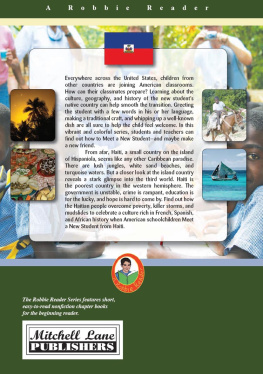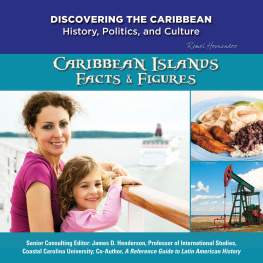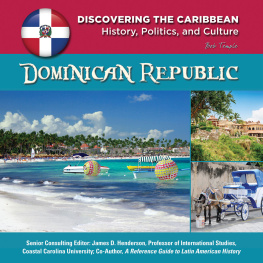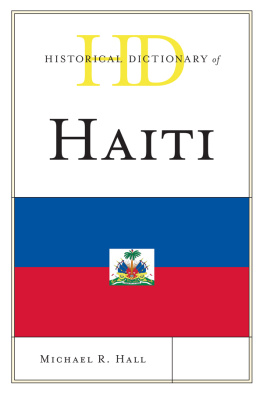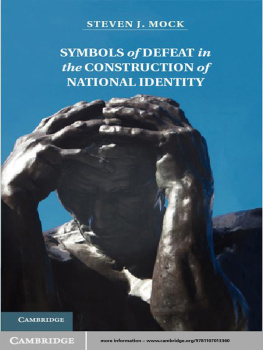
The author and publisher have provided this e-book to you for your personal use only. You may not make this e-book publicly available in any way. Copyright infringement is against the law. If you believe the copy of this e-book you are reading infringes on the authors copyright, please notify the publisher at: us.macmillanusa.com/piracy.
Contents
Preface
In Santo Domingo, the mere mention of Haiti provokes passionate reactions.
The woman there who rented me a studio apartment overlooking a garden bursting with yellow blooms and guava trees was of Spanish-Italian background. She treated me like a daughter. Every morning, she brought me a cup of caf con leche, which she made from instant coffee. She was so proud of the instant crystals, which her daughter brought from Puerto Rico because they were almost impossible to find in Santo Domingo at the time, that I didnt have the heart to tell her I preferred strong, dark Dominican coffee.
When I told her I was doing research on Haiti, she sniffed her nose in a typically Dominican expression of disdain. Then she lifted her long white finger, tapped her freckled forearm, and whispered that Haitians were so black, black as a telephone. The poor Haitians are like animals. All they can afford to eat are tins of sardines and a little rice, she said. Any time Haiti came up in conversation after that, she changed the subject. Her husband, who had dark olive skin and black wavy hair, was a retired colonel. When he mentioned to me that he was briefly stationed near the border, his wife drew her eyebrows together in worry, as if she wanted to forget even the idea of the western third of Hispaniola.
My landladys reaction was not unlike that of the middle- and upper-class Dominicans whom I told of my interest in Haiti. I was just speaking to some people from the United Nations who said Haiti would be better off if someone dropped a bomb on it. And theyre right, said the publisher of a newspaper in Santo Domingo.
The names of towns change from Spanish to French along the line marking the border between the Dominican Republic and Haiti. I decided to go to Hispaniola as soon as I saw that feature on the map, which reminded me of the place where my mother was born: Belgium, a small country divided, like the island of Hispaniola, into two languages and cultures. Long before I knew where the Dominican Republic or Haiti was, I spent several weeks in Brussels with my grandmothers family. My French-speaking Tante Mimis trips to buy bread and cheese at the little markets in the mostly Flemish suburb where she lived usually involved some moments of hesitation over whether she or the merchant would use the others language. My cousins dodged my questions about why they didnt know more than bits of Flemish and whether they had any Flemish-speaking friends. Political parties were split into factions according to language. After each national census, the government would fall amid Walloon and Flemish squabbling over how to gerrymander political districts by language.
With my Belgian relatives in mind, I applied for and won a grant from Rice University to study the politics of language and culture on Hispaniola. My questions were these: Did different languages make people think in fundamentally incompatible ways? Did culture make it impossible to find political solutions to conflict?
The more time I spent on Hispaniola, the less I believed that the cultural differences were the root of the problem. They were only the mask. The people of both countries are proud of their pumpkin soup. Their musicmerengue in Santo Domingo and konpa in Haitisounds very similar, both styles of music are based on European contredanse infused with a five-beat African rhythm. The main difference between them is the way they are enjoyed: Dominicans dance with a slight hitch while Haitians move symmetrically. The histories of their relationships with the United States were eerily parallel.
Dominicans often asked me about racism in Texas, where I grew up. I usually replied that racism in the American South now was less disturbing to me than that found in the North, in my familys home state of Wisconsin, for instance. In the South, egregious wrongs continued, but at least there was more interracial contact than in the North, where such a wall existed that white people often hushed their voices when talking about other races, religions, or ethnicities, as if they wished that the others would fade out of existence. I also found that, despite the debate over Haiti and constant references to skin color and good hair versus bad hair, Dominicans acknowledged contact between races more openly than Americans did.
I began to realize that the reactions of Dominicans to Haitians closely resembled the way Texans spoke about Mexicans in that illegal immigration, jobs, and land were the real issues behind racist slurs. I began to see the Dominican-Haitian conflicts in terms of immigration as well: more and more Haitians were coming to the Dominican Republic, which couldnt support its own people. Because their skin was darker than that of the mostly mulatto Dominicans, and because they spoke Kreyol instead of Spanish, the Haitians stood out. In Santo Domingo as in Texas, the debate often returned to the theme of jobs, even though the new immigrants were doing work the natives shunned.
Another summer, living in Santo Domingo on a grant from the Tinker Foundation and Columbia University, I spent most of my time in the ghettos and cane fields, where Haitians and Dominicans live and work together closely. These people switched back and forth between Haitian Kreyol and Spanish. They teased each other about their differences but were hardly the bitter enemies the Dominican government depicted. Many people volunteered that they had cousins, aunts, grandparents in the other country. People dealt with racial and cultural boundaries in subtle ways that often contradicted the official picture.
In September 1991, I was reporting in New York City for the Dominican newspaper Listn USA when Haitian military forces toppled the government of President Jean-Bertrand Aristide. When I started at the paper, the older, mostly male staff patronized me and resented my assignment to the United Nations. They didnt much trust what a young American woman could do, especially since her written Spanish was still shaky. But in this case, they were unanimous in their support of the publishers choice of me as the reporter to cover this coup. None of them wanted to go to Haiti. They justified their reluctance by telling me that a Dominican cameraman had been killed in the 1987 election massacre in Port-au-Prince. But behind their excuse, I sensed much deeper fears of the nation next door to the one where they were born. New York is about four hours from Haiti by plane; the flight from Santo Domingo to Port-au-Prince takes just over half an hour. Yet my New York newspaper was the first Dominican publication to send a reporter to Port-au-Prince after Aristides ouster.
Haitians live in a country on an island poor in material terms but rich in images and symbols. One symbol, the rooster, eclipses all others; it is so ubiquitous that it seems not that the Haitians have chosen it as their symbol but that the rooster has seized them. Haitian Vodou devotees say they do not choose the spirits that govern their religious lives; the spirits choose them. Vodou is a religion that mixes both Roman Catholic and African elements; it is a belief system rooted in right and wrong, in which practitioners serve Bondy, the Good Lord, who is aided by a coterie of saint-spirits, called lwa. Rising from somewhere in the unconscious, the lwa come alive in a collective Haitian consciousness.
Next page

